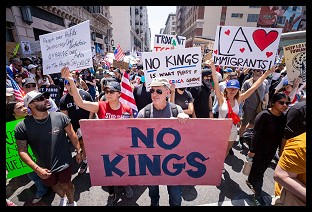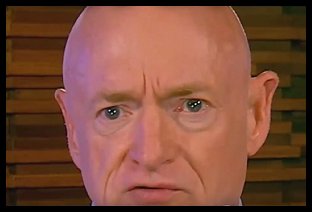Guest Blogged by Ernest A. Canning
"I would hope that a wise Latina woman with the richness of her experience would more often than not reach a better conclusion than a white male who hasn't lived that life." - Judge Sonia Sotomayor, 2001.
"I want to state up front, unequivocally and without doubt, I do not believe that any ethnic, racial, or gender group has an advantage in sound judging. I do believe that every person has an equal opportunity to be a good and wise judge regardless of their background or life experiences." - Judge Sonia Sotomayor, July 14, 2009.
 A fair reading of the full context of Judge Sotomayor's 2001 University of California remarks reveals that the above two statements are not inconsistent. In the first, Sotomayor was merely giving recognition to what cognitive science has long recognized --- that differences in culture, background, and experience create frames through which our minds process data, or as George Lakoff observes in Don't Think of an Elephant
A fair reading of the full context of Judge Sotomayor's 2001 University of California remarks reveals that the above two statements are not inconsistent. In the first, Sotomayor was merely giving recognition to what cognitive science has long recognized --- that differences in culture, background, and experience create frames through which our minds process data, or as George Lakoff observes in Don't Think of an Elephant and in greater depth in Moral Politics
: "Concepts are not things that can be changed by people telling us a fact. Frames are needed to make sense of the facts."
Sotomayor's personal history suggests a progressive world view, or what Lakoff refers to as the Nurturant Parent Model, which emphasizes concepts like empathy, fairness in opportunity and relativity.
Such concepts were put into stark contrast with those of her lead inquisitor in this week's Senate Judiciary Committee oversight hearings, where Sen. Jeff Sessions (R-AL) --- whose "checkered past" includes allegations of racism, a nearly-unprecedented rejection by a Republican-led Judiciary Committee for his appointment to the federal bench and a long track record of obsession with non-existent minority "voter fraud" --- led the ironic attack on her record...
The "conservative" frame arises from what Lakoff refers to as the Strict Father Morality, which lends itself to a more authoritarian mindset; a Manichean world-view that sees reality in absolutes. This thinking prevents some from appreciating, for example, how differences in gender and the concept of empathy can have a legitimate impact upon judicial decisions. One such example is the recent case involving the issue of whether a strip search of a 13 year old girl was "unreasonable." In that case, Justice Ruth Bader Ginsberg had to explain to her male counterparts something none of them had experienced --- the special sensitivities that come with being a 13 year old girl. It was a circumstance, only with such an appreciation in mind, that each of her male counterparts could hope to empathize.
Rightwing overreaction finds its embodiment in the opening remarks of Sessions at the Sotomayor confirmation hearings:
The appointment of a moderate jurist creates "a dangerous cross-road"? It appears that Sessions is oblivious to the impact of his own checkered past on how he perceives the world and those with whom he does not agree.
Jefferson Beauregard Sessions III is very much a product of the Jim Crow South. He was born Dec. 24, 1946, and raised in a rural Alabama town. As revealed by Sarah Wildman in a 2002 New Republic piece, "Closed Sessions," he would become one of only two Reagan judicial nominees who failed to be confirmed by a then Republican-controlled Senate in 1996. He was one of only two in fifty years to have such a distinction.
In a forerunner to more recent scandals, Sessions, as the U.S. Attorney for the Southern District of Alabama, initiated a dubious "voter fraud" prosecution against three civil rights workers in three "Black Belt" counties. Wildman observed, "Sessions' focus on these counties to the exclusion of others caused an uproar among civil rights leaders, especially after hours of interrogating black absentee voters produced only 14 allegedly tampered ballots out of more than 1.7 million cast in the state in the 1984 election."
A former Justice Department employee testified that Sessions had referred to the NAACP & ACLU as "Un-American" and "Communist inspired," even going so far as to suggest these groups "forced civil rights down the throats of people." Per Wildman, "Sessions...called a white civil rights lawyer a 'disgrace to his race' for litigating voting rights cases," and referred to the crucial, and bi-partisan supported 1965 Voting Rights Act as a "piece of intrusive legislation." At one point, Sessions reportedly said he used to think the KKK was "okay," at least until he learned they might be pot smokers.
The continued impact of his formative years, growing up on the wrong side of the civil rights movement, can be seen in Sessions' support for George W. Bush's judicial nominees such as Charles Pickering, who, Wildman reports, "in 1959 wrote a paper defending Mississippi's anti-miscegenation law, and Judge Dennis Shedd, who dismissed nearly every fair-employment civil rights case brought before him as a federal district court judge."
The question we are left with, then, is whether Sessions' perceived "dangerous cross-road" arises simply because he misunderstood Judge Sotomayor's 2001 "wise Latina" remark or because, at an unconscious level, he can't accept the idea of a Latina jurist who does not share his narrow world-view?
On Tuesday, Democracy Now! reviewed Sessions' "checkered past," including an archival clip from CBS' coverage of his rejection from the federal bench in 1986, and a look at his history of the pushing the old "voter fraud" canard in hopes of suppressing the minority vote in the South...
===
Ernest A. Canning has been an active member of the California State Bar since 1977 and has practiced in the fields of civil litigation and workers' compensation at both the trial and appellate levels. He graduated cum laude from Southwestern University School of Law where he served as a student director of the clinical studies department and authored the Law Review Article, Executive Privilege: Myths & Realities. He received an MA in political science at Cal State University Northridge and a BA in political science from UCLA. He is also a Vietnam vet (4th Infantry, Central Highlands 1968).


 With Thanks, No Kings and Good Cheer
With Thanks, No Kings and Good Cheer Presidential Illegality and the Duty to Disobey
Presidential Illegality and the Duty to Disobey Sunday 'Leave 'em in Stitches' Toons
Sunday 'Leave 'em in Stitches' Toons President of United States Calls for Killing Democratic Officials: 'BradCast' 11/20/25
President of United States Calls for Killing Democratic Officials: 'BradCast' 11/20/25 'Green News Report' 11/20/25
'Green News Report' 11/20/25 Is MAGA Finally Beginning to Fall Apart?: 'BradCast' 11/19/25
Is MAGA Finally Beginning to Fall Apart?: 'BradCast' 11/19/25 Trump's Terrible, Horrible, No Good, Very Bad Day (Week? Month? Year? Life?): 'BradCast' 11/18/25
Trump's Terrible, Horrible, No Good, Very Bad Day (Week? Month? Year? Life?): 'BradCast' 11/18/25 'Green News Report' 11/18/25
'Green News Report' 11/18/25 A Kaleidoscope of Trump Corruption: 'BradCast' 11/17/25
A Kaleidoscope of Trump Corruption: 'BradCast' 11/17/25 Sunday 'Back to Business' Toons
Sunday 'Back to Business' Toons Trump DOJ Takes Stand for Voting Whites in CA: 'BradCast' 11/13/25
Trump DOJ Takes Stand for Voting Whites in CA: 'BradCast' 11/13/25 'Green News Report' 11/13/25
'Green News Report' 11/13/25 Mamdani's 'Surprisingly Affordable' Afford-ability Agenda for NYC: 'BradCast' 11/12
Mamdani's 'Surprisingly Affordable' Afford-ability Agenda for NYC: 'BradCast' 11/12 After the Shutdown and Before the Next One: 'BradCast' 11/11/25
After the Shutdown and Before the Next One: 'BradCast' 11/11/25 2025 Election Victories; Also: 7 Dems, 1 Indie End Shutdown: 'BradCast' 11/10/25
2025 Election Victories; Also: 7 Dems, 1 Indie End Shutdown: 'BradCast' 11/10/25 'We Can See Light at the End of the Tunnel' After Election 2025: 'BradCast' 11/6/25
'We Can See Light at the End of the Tunnel' After Election 2025: 'BradCast' 11/6/25 BLUE WAVE! Dems Win Everything Everywhere All at Once: 'BradCast' 11/5/25
BLUE WAVE! Dems Win Everything Everywhere All at Once: 'BradCast' 11/5/25 Repub Thuggery As Americans Vote: 'BradCast' 11/4/25
Repub Thuggery As Americans Vote: 'BradCast' 11/4/25 Last Call(s) Before Election Day 2025: 'BradCast' 11/3/25
Last Call(s) Before Election Day 2025: 'BradCast' 11/3/25 A Pretty Weak 'Strongman': 'BradCast' 10/30/25
A Pretty Weak 'Strongman': 'BradCast' 10/30/25
 VA GOP VOTER REG FRAUDSTER OFF HOOK
VA GOP VOTER REG FRAUDSTER OFF HOOK Criminal GOP Voter Registration Fraud Probe Expanding in VA
Criminal GOP Voter Registration Fraud Probe Expanding in VA DOJ PROBE SOUGHT AFTER VA ARREST
DOJ PROBE SOUGHT AFTER VA ARREST Arrest in VA: GOP Voter Reg Scandal Widens
Arrest in VA: GOP Voter Reg Scandal Widens ALL TOGETHER: ROVE, SPROUL, KOCHS, RNC
ALL TOGETHER: ROVE, SPROUL, KOCHS, RNC LATimes: RNC's 'Fired' Sproul Working for Repubs in 'as Many as 30 States'
LATimes: RNC's 'Fired' Sproul Working for Repubs in 'as Many as 30 States' 'Fired' Sproul Group 'Cloned', Still Working for Republicans in At Least 10 States
'Fired' Sproul Group 'Cloned', Still Working for Republicans in At Least 10 States FINALLY: FOX ON GOP REG FRAUD SCANDAL
FINALLY: FOX ON GOP REG FRAUD SCANDAL COLORADO FOLLOWS FLORIDA WITH GOP CRIMINAL INVESTIGATION
COLORADO FOLLOWS FLORIDA WITH GOP CRIMINAL INVESTIGATION CRIMINAL PROBE LAUNCHED INTO GOP VOTER REGISTRATION FRAUD SCANDAL IN FL
CRIMINAL PROBE LAUNCHED INTO GOP VOTER REGISTRATION FRAUD SCANDAL IN FL Brad Breaks PA Photo ID & GOP Registration Fraud Scandal News on Hartmann TV
Brad Breaks PA Photo ID & GOP Registration Fraud Scandal News on Hartmann TV  CAUGHT ON TAPE: COORDINATED NATIONWIDE GOP VOTER REG SCAM
CAUGHT ON TAPE: COORDINATED NATIONWIDE GOP VOTER REG SCAM CRIMINAL ELECTION FRAUD COMPLAINT FILED AGAINST GOP 'FRAUD' FIRM
CRIMINAL ELECTION FRAUD COMPLAINT FILED AGAINST GOP 'FRAUD' FIRM RICK SCOTT GETS ROLLED IN GOP REGISTRATION FRAUD SCANDAL
RICK SCOTT GETS ROLLED IN GOP REGISTRATION FRAUD SCANDAL VIDEO: Brad Breaks GOP Reg Fraud Scandal on Hartmann TV
VIDEO: Brad Breaks GOP Reg Fraud Scandal on Hartmann TV RNC FIRES NATIONAL VOTER REGISTRATION FIRM FOR FRAUD
RNC FIRES NATIONAL VOTER REGISTRATION FIRM FOR FRAUD EXCLUSIVE: Intvw w/ FL Official Who First Discovered GOP Reg Fraud
EXCLUSIVE: Intvw w/ FL Official Who First Discovered GOP Reg Fraud GOP REGISTRATION FRAUD FOUND IN FL
GOP REGISTRATION FRAUD FOUND IN FL

































